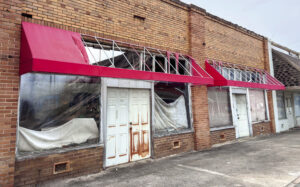Belgreen grad making his way in music
By Staff
Sheena Barnett
For the FCT
Behind every great guitar player is a great guitar pedal maker.
While pedals don't get the glory that guitars receive, they're just as an important part of music as the instrument itself. It's the guitar pedal that turns an ordinary guitar sound – called dry or straight – into something bigger, more distorted or unique.
Most non-guitar players know them as the small boxes laid out in front of guitarists at a concert. Guitarists can turn a knob or stomp a button on the pedal and change the sound of their guitar.
Tupelo, Miss., resident and Belgreen High School graduate Heath Scott hand-crafts pedals and modifies existing ones, and his business is starting to get as loud as the sounds his pedals make.
Scott, 27, got his start in the pedal biz by playing music.
"I was a typical kid; school got on my nerves," he said. "I started playing guitar in ninth grade…by 10th I had started my own band."
After high school, he was a session and touring player for bands.
When a pedal broke, he became interested in what made the small devices work.
"I literally would sit about three hours a night, for years," tinkering with the circuitry in pedals. "I destroyed about 10, 20 pedals … I'd take a part out, put another part in and learn what it did."
The more he practiced, the better he got, and he was finally able to go fulltime with his own pedal-making and modifying business, JHS Pedals, a few years ago.
Scott has made pedals for the likes of the Black Crowes, Switchfoot, Dashboard Confessional and Wavorly, a Christian band based out of Tupelo, as well as a host of session players.
"I hear stuff on the radio every two or three days that has my pedals on it," he said.
The average price for a Scott-made pedal is about $150, but premium models can cost as much as $350.
Blue wires, red wires
Scott himself builds the guts of a pedal – the circuitry inside the box. He starts with a copper board and prints the circuits he needs and then places the board in acid. The acid eats away at the copper until the circuits he needs are left. He builds from there, connecting tiny blue, yellow and red wires to the knobs on the box.
He oversees a staff of three – two fellow modifiers and one artist, who paints pedal boxes.
He does it all in his small shop, dubbed the Pink Palace for its pink insulation lining the walls, located behind his house in Tupelo. It's in the Pink Palace where he makes, modifies and repairs pedals, as well as trains his employees and prepares pedals for shipping. Scott
estimates he ships out about 35 pedals a week, all over the world.
"They love me at the post office," he said, laughing. Orders are simple, he said.
"They tell me what they want to hear and what they want it to look like," and he gets to work on them.
Besides the huge pedal-making businesses, like Boss, there are few people who work at Scott's level – maybe 10 in the U.S.
Still, "it's a surprisingly huge industry," he said. Besides guitarists, collectors also look for one-of-a-kind pedals to add to their collections, he said.
And those major corporations don't mind if Scott takes one of their models and tweaks it.
"There's no copyright in circuits," he said. "You buy a Honda Accord, you can do what you want with it."
He'll also remake older model pedals.
"I call them clones," he said.
Every guitar, amp, pedal and player are different, and all mix differently together, which Scott finds interesting. He also loves how even his mistakes can be a blessing in disguise.
"What's cool is when you think you built it right, but you built it wrong," he said.
For example, he created a brown pedal he named the Charlie Brown. He made a mistake in the process of building one, and it sounded totally different than it should have. So he kept it, replaced the white knobs with red ones and dubbed it the Angry Charlie Brown.
"And what's funny – I sell way more of the Angry Charlie Browns," he said. "That's the humbling factor."
Word of mouth
Scott has done no marketing for himself, besides his company's Web site and Twitter account. He sells pedals on eBay and relies on word of mouth.
He's considering a few business opportunities to take JHS Pedals to the next level, but he wants to focus on making a quality product in a timely – and personal – fashion.
The wait to get a JHS Pedal is anywhere from two weeks to a month. In making just one pedal, there may be several e-mails and phone conversations to go along with it, to ensure he makes just what the customer wants.
Besides, he has fun crafting unique pedals for unique guitarists.
"You can tell me to build a petal and put Ronald McDonald on it," he said, "and I'll do it."
This story was written by Sheena Barnett of the Northeast Mississippi Daily Journal in Tupelo, Miss.







